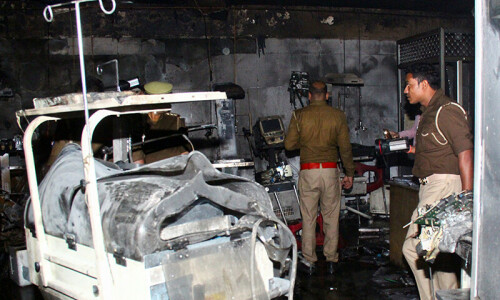CAIRO: Egypt’s dizzying ride over the past three years since the toppling of autocratic Hosni Mubarak has not only shaken up the country’s politics. It has revolutionised its pop culture scene, from language to music and art, bringing in a vibe of rebellion and voices from the urban poor.
New phrases have been coined and have become an inseparable part of everyday language. Graffiti has emerged as a new and popular art form, putting politics on city walls and chronicling the mood on the “revolutionary street”. Popular music has become dominated by young and rebellious musicians from urban slums who were once dismissed as vulgar. Their songs, blaring from Nile party boats, minibus taxis and the motorised rickshaws, have come to provide a soundtrack to Cairo’s bustling streets.
The changes bring new platforms for airing grievances and voicing demands for change and have spread with stunning speed among various levels of society.
What joins them is the spirit of “el-Meidan” or “The Square”. Initially, the term was just a shorthand reference to Cairo’s Tahrir Square, the centre of the 2011 uprising that brought down Mubarak and of protests since. But the term evolved to become a symbol for bringing together Egyptians of all social classes, ages, professions and sects to collectively demand change. The term has kept its resonance even as Egypt has become more bitterly divided over the country’s post-Mubarak path. Islamist and non-Islamists are now pitted against each other following the military’s July ouster of Islamist President Mohammed Morsi.
“El-Meidan” is not the only word that has gained new meaning as politics and turmoil infuse Egypt’s rich dialect of Arabic. “Sheep” has become an insult used by anti-Islamists against members of Morsi’s Muslim Brotherhood, a dig at their vows of obedience to their leaders. Islamists fire back with “worshippers of boots” to refer to supporters of the popularly backed military coup that ousted Morsi after a year in office. “The lemon squeezers” are secular and liberal Egyptians who voted for Morsi in the 2012 presidential election only to prevent his opponent, Mubarak’s last prime minister Ahmed Shafiq, from winning. It refers to an Arabic saying that if you’re given a terrible dish, all you can do is squeeze a lemon on it to make it more palatable.
More than any other form of pop culture, graffiti has epitomised the revolutionary mood. Little seen before 2011, graffiti now provides a substitute for galleries and museums that only a tiny minority of Egyptians bothers to visit. The canvas of choice for graffiti artists since 2011 has been a wall of the American University in Cairo running around 100 metres down a street from Tahrir. The images there speak of anger at the military. One shows a Dracula-like soldier with blood dripping from his mouth. Underneath him are skulls labelled “bread, freedom and social justice,” the slogan of the 2011 revolution. There is also the image of a chimp carrying a framed picture of a gorilla wearing a military cap, a dig at the adoration of the military leadership. “Down with everyone who committed betrayal,” declares a scrawled slogan.
The other art form on the streets is heard, not seen — “Mahraganat,” or “festival,” music, which emerged from the densely populated slums encircling Cairo. “It is the only genuine musical movement in Egypt now ... It has no boundaries,” said Mohammed Gamal, author of a book on Egypt’s hardcore soccer fans known as the Ultras, who are among the most avid Mahraganat fans, and a close follower of pop culture. Mahraganat musicians, in their late teens and early 20s, fill their rapid-fire songs with street slang, often lewd, about the life of the unemployed youth trying to get by, hitting topics of love, drugs, partying, and politics. Mahraganat style emerged before 2011, but it spread rapidly because of the loosening of societal restrictions attributed in part to the uprising. Now it is heard everywhere from weddings to the car stereos of upper-class youth. At a recent concert in the poor Cairo district of el-Marg, the Mahraganat band “el-Dawshagiyah” or “the Noisemakers” sang one of their songs to the crowd: “Hey girl, give me a kiss and I will give you my wallet. Give me a kiss and I will stop chasing you.” “We sing about the youths who are jobless and the revolution,” said Ahmed Shaaban, one of the band members. “The upper classes used to have nothing but contempt for us, now they look for our music.”— AP












































Dear visitor, the comments section is undergoing an overhaul and will return soon.